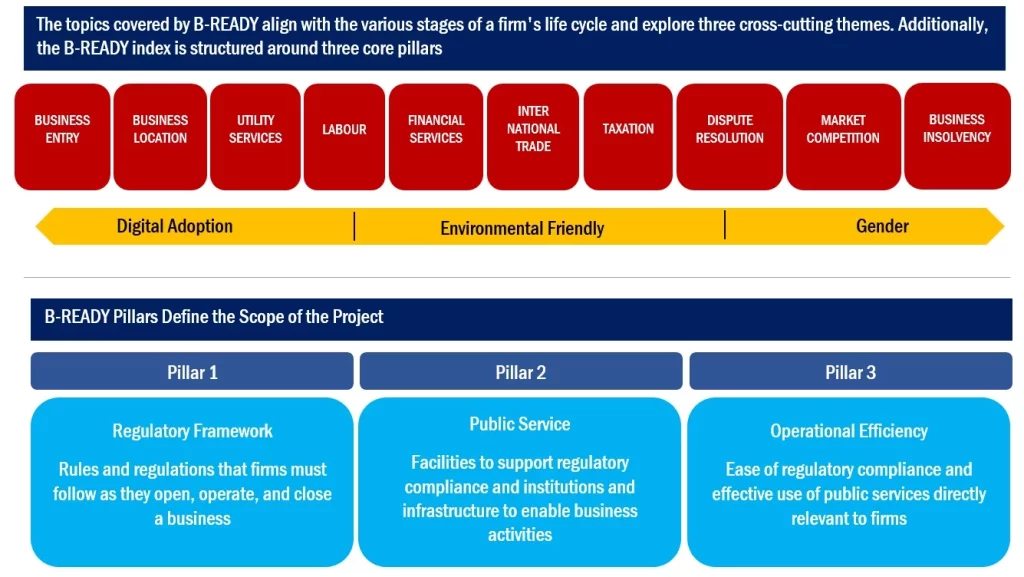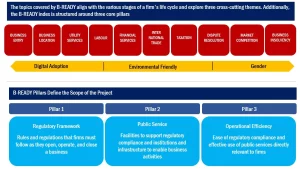
In 2024, the global approach to measuring business climate saw a major transformation. The World Bank Group introduced the Business Ready (B-READY) Index, its new flagship report aimed at assessing the business and investment environment across countries. This index replaces the discontinued Ease of Doing Business (EoDB) report and brings with it a more robust, implementation-focused, and reform-oriented methodology. While the inaugural edition of the B-READY Index covered 50 countries, Sri Lanka was not included. However, the World Bank has indicated its intention to expand the coverage globally by 2026. This gives Sri Lanka a valuable window of opportunity to get ready and initiate key reforms.
What is the B-READY Index?
The B-READY Index is built around three core pillars: Regulatory Framework, Public Services, and Operational Efficiency. These pillars are assessed through ten core thematic areas; business entry, business location, utility services, labor, financial services, international trade, taxation, dispute resolution, market competition, and business insolvency. In addition to these core topics, the index incorporates three cross-cutting themes digital adoption, environmental sustainability, and gender equity, which are integrated throughout the assessment process. One of the most significant advancements in this index is its methodology: it combines statutory (de jure) legal and regulatory analysis with practical (de facto) firm-level survey data. This approach ensures that both the letter of the law and its real-world implementation are evaluated.

According to the World Bank’s B-Ready-2024 report, the private sector is the engine of global development, generating approximately 90% of employment, over 70% of global output, and more than 80% of government revenues in developing countries. However, private investment in many of these economies has slowed since the global financial crisis. Governments alone cannot meet the scale of today’s development challenges. Instead, progress will depend on mobilizing private capital and creating an environment in which businesses, entrepreneurs, workers, and the broader society can thrive. The B-READY Index is a central part of the World Bank’s strategy to foster a dynamic and resilient private sector that drives sustainable and inclusive growth.
Why the B-READY Index Matters for Sri Lanka
The B-READY Index is more than just a benchmarking exercise, it is a reform blueprint that can support Sri Lanka’s economic recovery and long-term growth. It serves as a catalyst for private sector development by focusing on every stage of a business’s lifecycle, from entry to exit. This allows countries to identify and address systemic inefficiencies, unlock entrepreneurship, and build a more competitive economic environment.
A strong performance on the B-READY Index sends a powerful signal to global investors. It demonstrates that Sri Lanka is reform-oriented and ready for business. In an increasingly competitive region, where countries are actively courting foreign direct investment, inclusion in a credible, globally recognized index can help position Sri Lanka as a preferred investment destination. The index also provides policymakers with data-driven insights to benchmark Sri Lanka’s performance against its peers and global best practices. This evidence-based approach supports the design and implementation of targeted reforms while enhancing transparency and accountability.
In addition, the B-READY Index’s emphasis on digitalization, environmental sustainability, and gender equity aligns with Sri Lanka’s own development priorities. By encouraging reforms that promote inclusivity, environmental responsibility, and technological adoption, the index supports a holistic model of growth that benefits not only businesses but society at large.
Is Sri Lanka B-READY?
Sri Lanka has several strengths that support private sector development, including a well-educated workforce, a strategic geographic location, and a history of openness to trade and investment. Despite these advantages, the country faces longstanding bottlenecks that hinder its business environment. Regulatory processes are often complex and inconsistently implemented. Infrastructure gaps remain in areas such as logistics, utilities, and digital connectivity. Access to finance continues to be limited, especially for small and medium enterprises (SMEs). The labor market faces skills mismatches and structural rigidities. Public service delivery is often hindered by inefficiencies and a lack of transparency.
These challenges closely mirror the thematic areas of B-READY.
Business Entry: Regulatory processes are fragmented and duplicative.
Utility Services: Infrastructure gaps in electricity and water affect business reliability.
Labor: Skills mismatches persist across sectors.
Financial Services: SMEs face limited access to credit.
International Trade: Delays in cargo clearance and fragmented border processes undermine competitiveness.
Taxation: Tax administration lacks consistency and user-friendly digital interfaces.
Dispute Resolution: Legal procedures are slow and costly.
Market Competition & Insolvency: Fair competition frameworks and bankruptcy laws need modernization.
Business Insolvency: Outdated legal frameworks and prolonged court procedures hinder efficient resolution and make insolvency processes challenging.
Digital Adoption: Most public services remain offline or only partially automated.
Opportunities for Reform
To position itself for future inclusion in the B-READY Index, Sri Lanka should initiate a focused set of reforms that are both achievable and high-impact. One of the most effective ways to enhance efficiency, transparency, and investor confidence is through digitalization. Automating public services such as business registration, tax filing, customs clearance, and utility connections can significantly reduce costs, processing times, and administrative discretion; key elements evaluated under B-READY.
Another important area of reform is streamlining the permit and approval processes. Businesses in Sri Lanka often face delays due to overlapping mandates and fragmented processes across regulatory agencies. A coordinated, one-stop-shop with time-bound service delivery can substantially improve the ease and predictability of doing business.
Sri Lanka should also prioritize trade facilitation reforms under the B-READY Index’s “International Trade” component. The country’s competitiveness as a trading hub is undermined by delays in cargo clearance, inconsistent application of regulations, and inadequate digital integration among border agencies. Accelerating the implementation of key commitments under the WTO Trade Facilitation Agreement (TFA), such as introducing a fully functional National Single Window, streamlining documentary requirements, and enhancing risk-based inspection mechanisms, can significantly reduce trade costs. These reforms not only benefit exporters and importers, but also strengthen Sri Lanka’s position as a reliable and efficient link in global supply chains.
Equally important is the need to institutionalize private sector feedback in the reform process. Since B-READY prioritizes actual business experiences, it is essential to engage continuously with SMEs, exporters, and investors to identify bottlenecks and monitor the implementation of reforms. Real-time feedback mechanisms and structured public-private dialogues can help ensure reforms are responsive and adaptive.
The importance of preparing for the B-READY Index also aligns with the Ceylon Chamber of Commerce’s Vision 2030 policy document, which outlines a roadmap of transformative reforms needed to unlock Sri Lanka’s economic potential. Vision 2030 identifies priority areas such as improving the investment climate, simplifying regulations, enhancing trade facilitation, and fostering innovation, all of which closely align with the themes covered under the B-READY Index.
A Timely Opportunity
Sri Lanka’s absence from the first edition of the B-READY Index is not a reason for concern, but a timely reminder of the urgency for reform. With the World Bank aiming for global coverage by 2026, the next one-and-half years offer a crucial window to initiate meaningful changes that will not only improve Sri Lanka’s ranking but also build the foundations for a more competitive, inclusive, and resilient economy.
Being “Business Ready” is not just about gaining international recognition, it is about undertaking reforms that unlock investment, empower entrepreneurs, and create sustainable growth for the country.